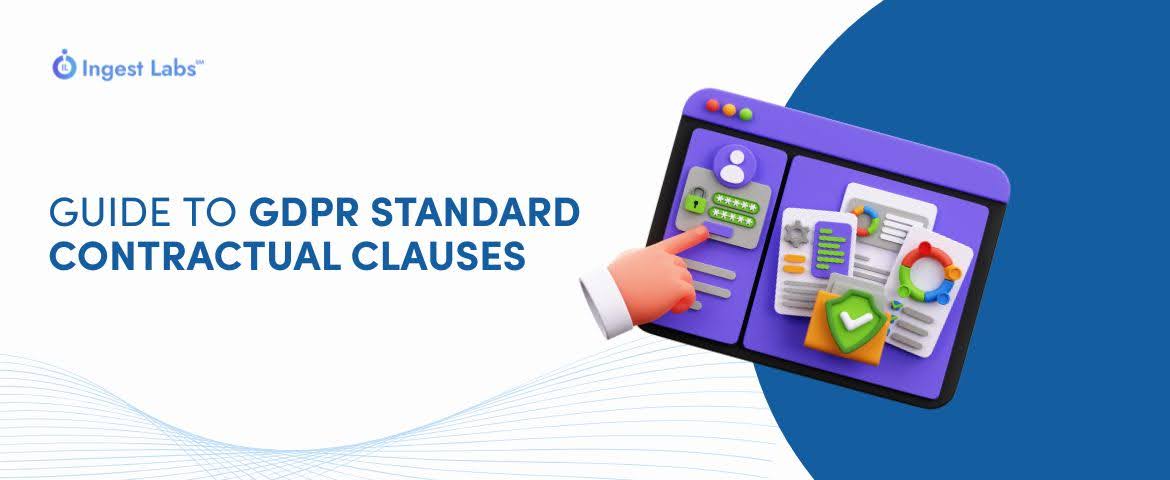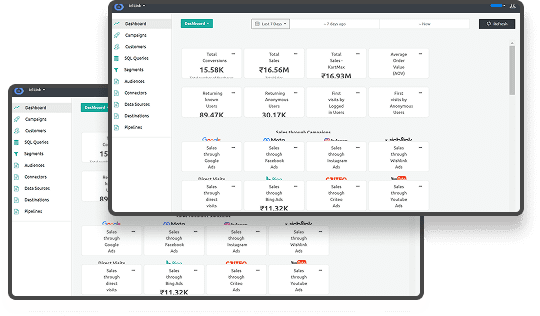Are your international data transfers truly compliant with evolving regulations?
As global data protection laws become increasingly stringent, U.S. businesses are facing heightened scrutiny over their cross-border data handling practices. In October 2024, the U.S. Department of Justice proposed new rules that would restrict the transfer of sensitive data, including health, financial, and geolocation information, to countries such as China, Russia, and Iran. These regulations aim to prevent misuse of American data and underscore the need for stringent compliance measures.
This blog discusses the role of GDPR Standard Contractual Clauses (SCCs) in facilitating lawful data transfers, providing insights into their structure, types, and implementation strategies to help your organization navigate the complexities of global data compliance.
What Are GDPR Standard Contractual Clauses (SCCs)?
Standard Contractual Clauses (SCCs) are pre-approved legal contracts provided by the European Commission that set out the conditions under which personal data can be transferred outside the EU. These clauses ensure that the transferred data remains protected by the same legal standards, regardless of its ultimate destination.
The purpose of SCCs is to facilitate cross-border data transfers while ensuring that the personal data of EU citizens is safeguarded according to the GDPR’s rigorous standards. They are particularly important for businesses that need to transfer data to countries outside the EU, which may not have adequate data protection laws.
SCCs also serve as an alternative for businesses that cannot rely on other data transfer mechanisms, such as the EU-U.S. Privacy Shield. They are legally binding and can be incorporated into a data processing agreement (DPA) between a data exporter and data importer.
Now that you understand the role of SCCs in regulating cross-border data movement, it’s worth examining why these clauses matter so much in real-world data transfers.
The Importance of GDPR SCCs for Data Transfers
GDPR Standard Contractual Clauses (SCCs) are integral when transferring personal data across borders. For businesses handling international data, adhering to SCCs isn't just a regulatory formality, and it's mandatory for maintaining compliance, protecting personal data, and safeguarding trust. Here’s why:
- Legal Requirement for Non-EU Transfers: Under the GDPR, transferring personal data outside the EU is permitted only if the destination country offers adequate data protection. SCCs provide one of the most widely used mechanisms for ensuring this compliance.
- Protection of Data Subject Rights: SCCs enforce strict conditions to uphold individuals’ data privacy rights even when personal information crosses borders. These clauses help mitigate the risks of data misuse or unauthorized access in jurisdictions with weaker data protection laws.
- Mitigating Data Privacy Risks: By adhering to SCCs, organizations demonstrate their commitment to complying with global data privacy regulations and ensuring robust protection for personal data.
SCCs are also essential for maintaining consumer trust and minimizing the risk of regulatory fines. Non-compliance with GDPR can result in substantial penalties, including up to 4% of annual global turnover.
Understanding why SCCs matter is one thing, but to truly apply them, you’ll need to know how they’re structured and what each part of the clause covers.
The Structure of Standard Contractual Clauses
The Standard Contractual Clauses (SCCs) provided by the European Commission are designed to create a clear framework that outlines the responsibilities of both the data exporter and the data importer. These clauses ensure that personal data remains protected as it crosses borders and provide a structured approach to data protection compliance.
At the core of these clauses are four main components:
1 Parties Involved
The agreement outlines the roles of the data exporter, typically located in the EU, and the data importer, which is based outside the EU. These two parties must adhere to the terms of the SCC to ensure data protection remains consistent throughout the transfer process.
2 Data Subject Rights
One of the most important aspects of SCCs is their focus on the rights of individuals whose data is being transferred. The clauses specify the data subject's rights, which include the ability to access, correct, erase, and transfer their data. These rights are integral to maintaining transparency and ensuring that personal data is handled with respect.
3 Obligations of Data Exporter and Importer
Both the exporter and importer have specific duties under the SCCs. These obligations include taking necessary steps to protect the data, such as implementing robust security measures. Additionally, both parties must report data breaches promptly and comply with relevant local privacy laws. This helps maintain high data protection standards, regardless of where the data ends.
4 Data Transfer Details
The clauses specify the details of the data transfer, including the type of data being moved, the reasons for the transfer, and its protection during transit. They also outline security measures to prevent unauthorized access or leaks, thereby fostering trust between the parties and ensuring that data protection is prioritized.
With the framework in place, the next step is determining which clauses to apply, as not all SCCs are built together. Let’s examine the two main types and determine when to use each.
Read: Understanding the Role of Ingest Labs in GDPR Compliance: A Step-by-Step Guide
Types of SCCs under GDPR
GDPR provides different sets of Standard Contractual Clauses (SCCs) based on the relationship between the data exporter and the data importer. These clauses ensure data transfers comply with GDPR’s strict data protection standards.
The two main types of SCCs are:
1 Controller-to-Controller Clauses
These clauses apply when both parties involved in the data transfer are data controllers, which are organizations that determine the purposes and means of processing personal data. In this type of transfer, both entities independently control the data, and the clauses define how they share and protect the data.
- Typical Use Case: Often used when two separate companies collaborate, such as a marketing agency and an e-commerce platform. Both entities collect and use the data for their purposes.
- Key Responsibilities:
- Both parties are responsible for complying with GDPR when processing personal data.
- Data controllers must implement measures to ensure data security and be transparent with data subjects about how their data is used.
- Data Subject Rights:
- The clauses establish clear terms for how data subjects can exercise their rights, such as access, correction, and deletion of their data.
- Both parties must respect these rights and provide a clear process for data subjects to exercise them.
- Security Measures:
- Each party must ensure that the data is protected by adequate technical and organizational measures, even if they have separate systems and processes for handling the data.
2 Controller-to-Processor Clauses
These clauses apply when one party is a data controller, and the other party is a data processor; an entity that processes personal data on behalf of the controller. The processor does not own or use the data but acts under the controller's instructions. This type of SCC is beneficial when a business outsources specific tasks to third parties, such as using a cloud service to store customer data.
- Typical Use Case: Common in outsourcing arrangements, such as a company using a third-party service provider to manage customer data or process payments on its behalf.
- Key Responsibilities:
- The controller is responsible for determining the purpose and means of processing personal data. At the same time, the processor must follow the controller’s instructions and cannot use the data for any other purposes.
- Processors must ensure they protect the data and follow all the controller's instructions.
- The processor must also assist the controller in ensuring compliance with GDPR requirements, such as facilitating audits or responding to data subject requests.
- Data Subject Rights:
- The processor must support the controller in enabling data subjects to exercise their rights, including providing them with information and responding to requests for access, correction, or erasure.
- The controller is ultimately responsible for upholding these rights, but the processor must cooperate as necessary.
- Security Measures:
- The processor must implement security measures and practices that meet the requirements set by the controller.
- In some cases, the processor must also notify the controller of any issues with data security, such as a data breach or potential vulnerability.
Once you’ve identified which type of clause fits your setup, the focus shifts to implementing these agreements. Let’s walk through the process of adopting SCCs within your organization.
Steps for Implementing SCCs in Your Organization
Implementing GDPR-compliant Standard Contractual Clauses (SCCs) is a crucial step for businesses engaged in international data transfers. These clauses establish the legal framework for protecting personal data when it is transferred outside the EU. Follow these steps to ensure your organization is fully compliant with GDPR and maintains a strong data protection strategy:
1 Assess Data Transfers
The first step is to identify all international data transfers within your organization. Understand where your data is moving and which transfers fall outside the EU, as these are the ones that require Standard Contractual Clauses (SCCs) for compliance with the GDPR. This audit will ensure that you are aware of which data flows require attention and which are already compliant.
2 Review Data Processing Agreements
Next, check your current contracts with data importers and exporters. Verify if the relevant SCCs are included in your Data Processing Agreements (DPAs). If SCCs are missing, they should be added to ensure compliance. The DPA will serve as a clear framework for processing and protecting data.
3 Consult Legal Teams
Collaborate with your legal team to tailor the Standard Contractual Clauses (SCCs) to your organization's specific needs. Legal experts will help ensure the clauses are current and in line with the latest GDPR. They can assist in drafting or revising the SCCs to reflect your unique business processes and data-handling activities.
4 Incorporate SCCs into Contracts
Once your SCCs are ready, ensure they are incorporated into all relevant contracts with third-party vendors, partners, or any other entity involved in cross-border data transfers. This step ensures that all parties involved are legally bound to protect the data by GDPR standards, thereby reducing risks and ensuring transparency.
5 Regular Audits and Compliance Checks
Data protection is an ongoing responsibility. Regularly audit your data processing activities to confirm that SCCs are being followed. This includes checking for any updates or changes to the regulations that may necessitate revisions to your agreements. Staying proactive with audits will help you avoid compliance issues and maintain strong data security.
As data privacy regulations evolve, Ingest Labs simplifies compliance with advanced tools like Ingest IQ, Ingest ID, and Event IQ. These solutions streamline first-party data management, ensuring GDPR compliance while empowering businesses in digital marketing, e-commerce, and advertising to focus on growth.
As with most compliance measures, even a well-documented plan has challenges. So, let’s discuss the common obstacles companies face with SCCs and how they can be addressed.
GDPR Compliance Challenges for SCCs
Implementing SCCs can present several challenges for businesses, including varying international data protection laws and the complexities of managing cross-border data transfers. Understanding and addressing these challenges is essential for maintaining compliance.
- Varying Data Protection Laws: Some non-EU countries have weaker data protection laws, making it challenging to ensure sufficient safeguards. However, Ingest Labs’ tools help streamline compliance with global privacy standards.
- Managing Cross-Border Transfers: Coordinating data transfers across different jurisdictions can be complex, but Ingest Lab offers privacy-compliant tools that are useful in this context.
- Data Breach Notification: Ensuring timely breach notifications across borders is challenging, yet Ingest Labs provides advanced data monitoring to track and alert on any discrepancies.
- Changing Regulatory Landscape: Keeping up with evolving regulations can be challenging, but Ingest Labs ensures your business stays compliant with real-time updates and automated compliance tools.
- Documentation and Auditing: Maintaining proper documentation and audits can be overwhelming, but Ingest Labs helps with detailed reporting and audit trails for seamless compliance management.
Despite these challenges, SCCs continue to be a reliable means of upholding data privacy standards. As we wrap up, let’s recap the key takeaways and why taking action now can save your organization time and risk later.
Final Thoughts
In conclusion, GDPR Standard Contractual Clauses are essential for businesses that engage in cross-border data transfers. By implementing SCCs, companies can ensure compliance with GDPR, protect their customers’ data, and avoid potential fines. The next step for any organization handling international data transfers is to evaluate its data flow and ensure that appropriate Standard Contractual Clauses (SCCs) are in place.
While SCCs are important for GDPR compliance, they’re only part of the process. Ingest Labs helps businesses take the next step by providing tools that support responsible data use. With Ingest IQ, Ingest ID, and Event IQ, you can manage consent, accurately track user behavior, and keep customer data organized, all in line with relevant privacy regulations. If your business handles cross-border data, Ingest Labs supports you in staying compliant and making your data useful.
Want to see how it works? Book a quick demo with Ingest Labs to determine the optimal setup for your data and compliance requirements.






